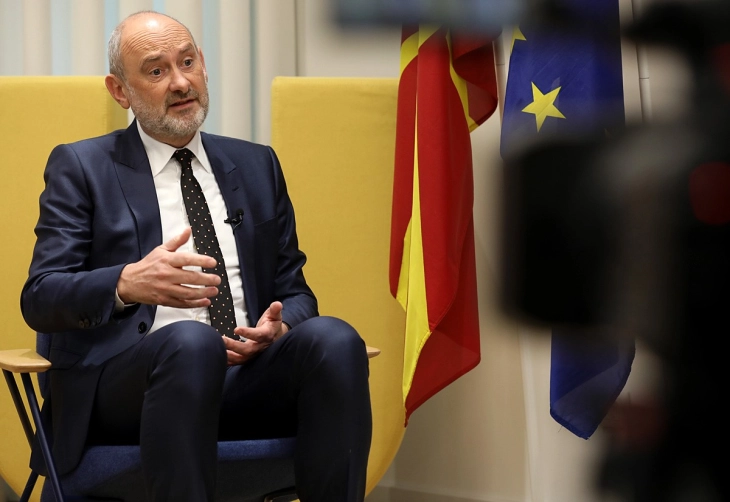Geer: Negotiating process to stop if Constitution not changed
- Post By Ivan Kolekevski
- 10:15, 31 July, 2022

Skopje, 31 July 2022 (MIA) – Negotiations have opened, the screening has begun. Holding of the next intergovernmental conference is dependant upon the bilateral agreement between the two countries concerned. If the constitutional changes do not go ahead, the negotiating process will likely stop and wait on the resolution of the issue, says European Union Ambassador David Geer in an interview with Radio Free Europe.
“The way in which the agreement is constructed: negotiations have opened, the screening has begun and we held the Intergovernmental Conference to kick the process off. Once the screening is complete at this stage, to go to the next point, there would have to be another intergovernmental conference,” says Ambassador Geer.
According to him, the holding of this IGC is dependant upon this bilateral agreement between the two countries concerned.
“Of course, it is a sovereign decision for North Macedonia to change the Constitution, although you already have a good record on interethnic relations, and this would further solidify that. But what would happen if it didn’t go ahead. I think the most likely scenario would be that the accession process would stop there. You would have completed the screening but the holding of the IGC and the next steps would wait, pending the resolution of this issue, not because a third country has come and vetoed but because this country decided to step back from that commitment that it has made bilaterally with Bulgaria,” says Geer.
Asked about the possibility of a referendum, he says this is a sovereign decision for the country to make, refraining from commenting specifically on that.
“Again, maybe we could step back and look at the big picture here. The strategic choice that this country has made for a number of years now is to enter into the EU and the process has now been launched. Why is it important? There are a number of clear reasons why this country would benefit from membership in the EU and the Union would benefit from having you as part of the family. On the economic side, the EU is the largest single market in the world, also your neighbor. This offers enormous opportunities for business, for trade, for investments, for improvement of living standards and livelihoods, for ensuring that young people develop the skills necessary to compete in the job market in this bigger single market. But it’s not just that. There are also other very clear benefits from accession to the European Union,” notes Geer.
He says it is for VMRO-DPMNE to set out their position on different issues, as it is for all parties to do that.
“I don’t want to go into giving views on specific parties. We are ready to talk to all partners who are committed to the European integration path,” says Geer.
On EU’s guarantees that Bulgaria will not prevent or block the negotiations in case when North Macedonia meets its commitments from the bilateral protocol, the EU Ambassador says the Union understands identity issues.
“There were many emotions and concerns about the national identity during the consultations and the public debate related to the opening of the membership negotiations and this agreement. People said the national identity would be put into question, that this would be, as some have said, ‘bulgarization’ of the country through the membership process. Again, we have all heard the European Council President, the European Commission President, two key players in the membership process, saying that the membership process is carried out on the basis of European standards and principles, going as far as saying that the issues such as identity cannot be criteria or benchmarks in the process. President von der Leyen said in the Parliament that interpretation of history, for example, is an aspect that should not be incorporated,” says Geer.
According to him, bilateral issues had been raised in the membership negotiations before.
“Slovenia, Croatia, other countries as well. The process within the institutions is seen through the focus of reforms that have to be implemented. Therefore, I think there are very clear indications by the EU and member states that they want this process to follow European standards and principles. We understand identity issues. In fact, EU High Representative Borrell told the IGC ‘we understand the identity issues but don’t lose your identity during the process’. No country has ever done this. Look at the countries that have joined. Did the Spaniards become less Spanish, did the Estonians, a smaller country, become less Estonians, did the Maltese, an even smaller country, become less Maltese? No, clearly not. And there is no reason for this country should have its identity put in doubt in any way whatsoever,” says Geer.
It is also important, he adds, because you asked me are there guarantees and we have to be clear – there are no guarantees.
“The process itself consists of a series of moments when unanimous decisions need to be taken. That is how it works, for all countries concerned. No negotiating framework can guarantee that other issues may not be raised. If they are raised though, the European Union, as it had done in other accession process, will deal with them,” underlines Ambassador Geer.







